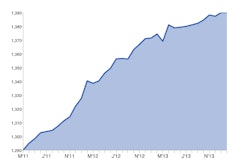A member of the Bendix Spicer Foundation Brake LLC (BSFB) leadership team will provide expertise on the federal Reduced Stopping Distance (RSD) mandate at the American Trucking Associations’ 2014 Technology & Maintenance Council (TMC) Annual Meeting & Transportation Technology Exhibition. This year’s meeting is themed “Turning Experience into Practice” and takes place March 10-13, 2014, in Nashville, Tenn.
Gary Ganaway, director of marketing and global customer solutions and a 12-year TMC member, will be a presenter for the technical session “Understanding the Reduced Stopping Distance Brake Technology & Resulting Maintenance Issues.” The S.6 Chassis and Braking System Study Group Session is among the event’s technical meetings exploring commercial vehicle maintenance and design.
Phase one of the federal Reduced Stopping Distance mandate took effect in August 2011 for new three-axle tractors with Gross Vehicle Weight Ratings (GVWRs) up to 59,600 lbs. Phase two of the mandate, aimed at tractors with two axles, as well as severe service tractors with GVWRs above 59,600 lbs., took effect Aug. 1, 2013.
Confusion about replacement brake lining performance and RSD compliance is one key issue Ganaway will address during the technical session.
“We regularly field a host of questions from fleets and maintenance personnel about replacement friction for RSD-compliant brakes,” Ganaway said. “And that’s understandable because the market is filled with conflicting information about aftermarket brake lining certification and updated requirements for today’s high performance brakes. As a result, it’s more critical than ever before to understand the implications that replacement friction selection has on RSD brake performance and highway safety.”
Ganaway will discuss the significant gap in performance between certified RSD friction and other materials marketed as acceptable under RSD. For a friction material to be certified RSD compliant, it must not only be dynamometer certified to Federal Motor Vehicle Safety Standard (FMVSS) 121 requirements, it must also pass the new – and more demanding – vehicle performance test.
“The Technology & Maintenance Council is the industry’s foremost authority in defining recommended practices for commercial vehicles,” Ganaway said. “Bendix is proud to be a leading voice on Reduced Stopping Distance and pleased to contribute to the TMC discussion on understanding the mandate. The dialogue is essential for promoting safer trucks and highways, as well as healthier fleets.”











